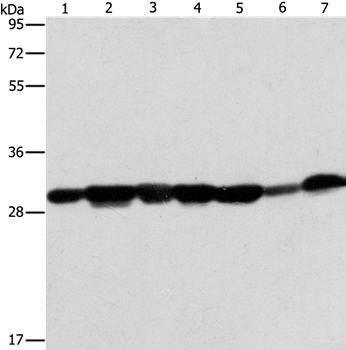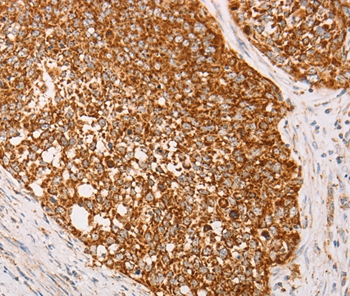Product Detail
Product NameAK2 Antibody
Host SpeciesRabbit
ClonalityPolyclonal
PurificationAntigen affinity purification.
ApplicationsWB IHC
Species ReactivityHu Ms
SpecificityThe antibody detects endogenous levels of total AK2 protein.
Immunogen TypeRecombinant Protein
Immunogen DescFusion protein corresponding to residues near the N terminal of human adenylate kinase 2
Target NameAK2
ConjugateUnconjugated
Other NamesADK2; AK 2
Accession NoSwiss-Prot#: P54819
NCBI Gene ID: 204
Gene Accssion: BC009405
Uniprot
P54819
Gene ID
204;
Sdspage MW26kd
Concentration1.6mg/ml
FormulationRabbit IgG in pH7.4 PBS, 0.05% NaN3, 40% Glycerol.
StorageStore at -20˚C
Application Details
Western blotting: 1:500-1:2000
Immunohistochemistry: 1:50-1:200
Gel: 10%SDS-PAGE
Lysates (from left to right): Human placenta tissue and A549 cell, mouse brain tissue and hepG2 cell, Raji cell and human fetal liver tissue, hela cell
Amount of lysate: 40ug per lane
Primary antibody: 1/300 dilution
Secondary antibody dilution: 1/8000
Exposure time: 20 seconds
Immunohistochemical analysis of paraffin-embedded Human cervical cancer tissue using #36210 at dilution 1/40.
Adenylate kinases are involved in regulating the adenine nucleotide composition within a cell by catalyzing the reversible transfer of phosphate groups among adenine nucleotides. Three isozymes of adenylate kinase, namely 1, 2, and 3, have been identified in vertebrates; this gene encodes isozyme 2. Expression of these isozymes is tissue-specific and developmentally regulated. Isozyme 2 is localized in the mitochondrial intermembrane space and may play a role in apoptosis. Mutations in this gene are the cause of reticular dysgenesis. Alternate splicing results in multiple transcript variants. Pseudogenes of this gene are found on chromosomes 1 and 2.
If you have published an article using product 36210, please notify us so that we can cite your literature.
et al,Effects of the Nonsteroidal Anti-inflammatory Drug Celecoxib on Mitochondrial Function.In Biol Pharm Bull. On 2018 by Tatematsu Y, Fujita H et al..PMID:29491208
, (2018),
PMID:
29491208




 Yes
Yes



